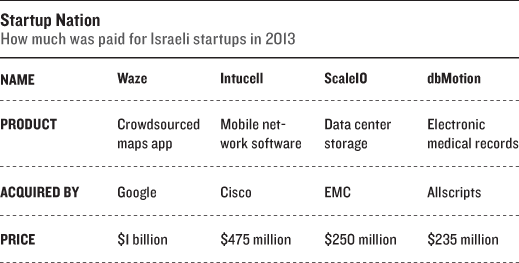Israel’s Military-Entrepreneurial Complex Owns Big Data
Two years ago, a half-dozen programmers and entrepreneurs started working together in a Tel Aviv basement to create one of Israel’s 5,000 high-tech companies. It was a stealth company, but these 20-somethings were used to secrecy. Most had served together in the same military intelligence unit of the Israel Defense Forces.
In the army, they worked on algorithms that could predict the behavior of Israel’s enemies by plucking patterns from intercepted signals. Their new company was based on much the same idea–but it aimed to guess the preferences of consumers. It was called Any.Do. By the end of 2012 their productivity app for smartphones was one of the most popular downloads worldwide.
Each year, Israel’s military puts thousands of teenagers through technical courses, melds them into ready-made teams, and then graduates them into a country that attracts more venture capital investment per person than any in the world. The result, according to the 2009 book Start-Up Nation, is an “economic miracle” that’s seen high-tech exports balloon to $25 billion per year, about a quarter of Israel’s exports.
Israel’s military-entrepreneurial complex has lent it a particular edge in analytics and big data. “Their main expertise was to extract intent from messages that are being sent across different communications channels,” says Any.Do CEO Omer Perchik of his team. “What we’re building is a kind of action engine where we extract the user’s intent from his tasks and enable him to actually execute those tasks from within his mobile device.”
Military service in Israel is generally compulsory, lasting two or more years. Many would-be entrepreneurs apply to the IDF’s computer training academy, known as Mamram. Located at a base outside Tel Aviv, it acts a bit like a school for startups, teaching programming and project management to cadets in olive-green uniforms. Young hackers with proven skills get recruited by specialized intelligence units such as Matzov, the army’s cybersecurity division, or units involved in signals intelligence and eavesdropping.

“What happens in the military is we take these really bright young 18-year-olds and say: Here’s a data center the size of Google and Facebook combined. Go do something mission critical,” says Michael Eisenberg, a general partner at the venture capital firm Benchmark Capital. “Now they are spilling out of the army, and we have the highest and best concentration in Israel of big-data engineers and analysts anywhere in the world.”
That explains why IBM, Google, Microsoft, EMC, Intel, General Electric, eBay, Cisco, and other giants all have major research centers in Israel, where more than 230,000 people are employed in high-tech fields. In the past two years, Israeli companies specializing in mobile computing, cybersecurity, and data storage have been snapped up for ever-increasing sums, culminating in the June acquisition of the mapping app Waze by Google for more than $1 billion.
Tal Marian, founder of the TechLoft, a shared workspace in the “Tech Mile” around Rothschild Boulevard in Tel Aviv, says the effects on the startup scene have been profound. “Some of the military units work like a civilian organization,” he says. There’s “the feeling that if you come up with a good idea that answers a real need of that unit’s mission, you will get the funding and manpower and time you need.”
Sometimes the military connection to startups is obvious: the miniaturized camera and power pack in a camera pill developed by Given Imaging is based on the equipment in the nose of a military drone. Other connections are more obscure. Some aspects of Israeli expertise in mobile communications networks, for example, were developed as part of a defensive measure against terror attacks by Palestinians. The details are still top secret.
Another factor boosting Israel’s startup scene is the low cost of college, about $3,000 a year. Students typically emerge from military service and university with no debt, which allows many to take a year off to pursue their dreams.
Sometimes they come true. The success of Waze has reinvigorated an already bubbling market. Just as Any.Do is based on predictive analysis of large amounts of data, Waze applies the same techniques to crowdsource accurate traffic information and maps in real time. It’s widely believed that the Israeli military has a decade-long lead on the U.S. and Europe in big-data skills. Waze’s co-founder, Uri Levine, also got his start as a military software developer.
“Big data was not a brand 10 years ago, but it was already there in intelligence organizations,” says Elik Ber, a former military officer now working for Meidata, a business research company. “Now when a consumer company wants to know who bought their product everywhere in the world, they’re facing the same kind of challenge.”
Keep Reading
Most Popular
How scientists traced a mysterious covid case back to six toilets
When wastewater surveillance turns into a hunt for a single infected individual, the ethics get tricky.
The problem with plug-in hybrids? Their drivers.
Plug-in hybrids are often sold as a transition to EVs, but new data from Europe shows we’re still underestimating the emissions they produce.
What’s next for generative video
OpenAI's Sora has raised the bar for AI moviemaking. Here are four things to bear in mind as we wrap our heads around what's coming.
Stay connected
Get the latest updates from
MIT Technology Review
Discover special offers, top stories, upcoming events, and more.